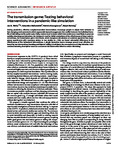The Transmission Game: Testing behavioral interventions in a pandemic-like simulation
| dc.contributor.author | Woike, Jan Kristian | |
| dc.contributor.author | Hafenbrädl, S | |
| dc.contributor.author | Kanngiesser, P | |
| dc.contributor.author | Hertwig, R | |
| dc.date.accessioned | 2022-03-07T01:51:10Z | |
| dc.date.issued | 2022-02-25 | |
| dc.identifier.issn | 2375-2548 | |
| dc.identifier.issn | 2375-2548 | |
| dc.identifier.other | ARTN eabk0428 | |
| dc.identifier.uri | http://hdl.handle.net/10026.1/18890 | |
| dc.description.abstract |
<jats:p>During pandemics, effective nonpharmaceutical interventions encourage people to adjust their behavior in fast-changing environments in which exponential dynamics aggravate the conflict between the individual benefits of risk-taking and its social costs. Policy-makers need to know which interventions are most likely to promote socially advantageous behaviors. We designed a tool for initial evaluations of the effectiveness of large-scale interventions, the transmission game framework, which integrates simulations of outbreak dynamics into large-group experiments with monetary stakes. In two studies (<jats:italic>n</jats:italic>= 700), we found substantial differences in the effectiveness of five behavioral interventions. A simple injunctive-norms message proved most effective, followed by two interventions boosting participants’ ability to anticipate the consequences of risky behavior. Interventions featuring descriptive norms or concurrent risk information failed to reduce risk-taking.</jats:p> | |
| dc.format.extent | eabk0428- | |
| dc.format.medium | Print-Electronic | |
| dc.language | en | |
| dc.language.iso | en | |
| dc.publisher | American Association for the Advancement of Science | |
| dc.subject | Clinical Research | |
| dc.subject | Behavioral and Social Science | |
| dc.subject | Prevention | |
| dc.title | The Transmission Game: Testing behavioral interventions in a pandemic-like simulation | |
| dc.type | journal-article | |
| dc.type | Journal Article | |
| plymouth.author-url | https://www.webofscience.com/api/gateway?GWVersion=2&SrcApp=PARTNER_APP&SrcAuth=LinksAMR&KeyUT=WOS:000763313300009&DestLinkType=FullRecord&DestApp=ALL_WOS&UsrCustomerID=11bb513d99f797142bcfeffcc58ea008 | |
| plymouth.issue | 8 | |
| plymouth.volume | 8 | |
| plymouth.publication-status | Published | |
| plymouth.journal | Science Advances | |
| dc.identifier.doi | 10.1126/sciadv.abk0428 | |
| plymouth.organisational-group | /Plymouth | |
| plymouth.organisational-group | /Plymouth/Faculty of Health | |
| plymouth.organisational-group | /Plymouth/Faculty of Health/School of Psychology | |
| plymouth.organisational-group | /Plymouth/REF 2021 Researchers by UoA | |
| plymouth.organisational-group | /Plymouth/REF 2021 Researchers by UoA/UoA04 Psychology, Psychiatry and Neuroscience | |
| plymouth.organisational-group | /Plymouth/REF 2021 Researchers by UoA/UoA04 Psychology, Psychiatry and Neuroscience/UoA04 Psychology, Psychiatry and Neuroscience MANUAL | |
| plymouth.organisational-group | /Plymouth/REF 2021 Researchers by UoA/UoA04 Psychology, Psychiatry and Neuroscience/UoA04 REF peer reviewers | |
| plymouth.organisational-group | /Plymouth/Users by role | |
| plymouth.organisational-group | /Plymouth/Users by role/Academics | |
| dc.publisher.place | United States | |
| dcterms.dateAccepted | 2021-12-30 | |
| dc.rights.embargodate | 2022-3-8 | |
| dc.identifier.eissn | 2375-2548 | |
| dc.rights.embargoperiod | Not known | |
| rioxxterms.versionofrecord | 10.1126/sciadv.abk0428 | |
| rioxxterms.licenseref.uri | http://www.rioxx.net/licenses/all-rights-reserved | |
| rioxxterms.licenseref.startdate | 2022-02-25 | |
| rioxxterms.type | Journal Article/Review |


